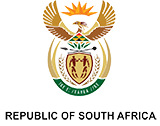Dear fellow South African,
Efforts to improve the lives of South Africans will only succeed when we effectively address the challenges in local government.

Last week, the Auditor-General released the Municipal Audit Outcomes for 2021/2022. It is worrying that only 38 out of 257 municipalities – and only two out of the eight metros – achieved clean audits. While clean audits are not the only indicator of good service delivery, there is a clear correlation between achieving good audit outcomes and improving services to communities.
Local government provides the infrastructure and services that help improve people’s livelihoods. All spheres of government must therefore work together to ensure that municipalities are able to fulfil their responsibilities.
This issue of improving the lives of our people was prominent on the agenda of the President’s Coordinating Council (PCC), which met in Cape Town last Friday. The PCC is the President’s platform for consultation with provinces and organised local government to coordinate and strengthen the implementation of government programmes.
The Council makes an important contribution to the District Development Model, which approaches local development in an integrated way that focuses the efforts of local, provincial and national government at the district level.
The Council was presented with proposals on local government reform and improving intergovernmental coordination in the critical areas of electricity distribution, water and sanitation services, waste management and roads.
The Council focused on the challenge of municipal underspending. While many municipalities are in great financial difficulty, they often do not spend the grants they are allocated by the national government.
In the last year, around 88 municipalities failed to spend at least 10% of their Municipal Infrastructure Grant, which is supposed to be used for eradicating infrastructure backlogs. Another challenge is that money that is not allocated for a specific purpose is often misspent.
A number of municipalities state that they do not have sufficient funds to implement programmes and projects. This is often the case because they are not able to collect revenue for key services like water and electricity.
It is imperative that municipalities must have credible, sustainable and well-managed revenue collection programmes that apply fair and equitable standards to all customers. Citizens should play their part by paying for services. All businesses and government departments must pay outstanding debt to municipalities.
The PCC recommended that National Treasury and the Department of Cooperative Governance should develop measures to further support and strengthen municipal revenue collection systems with urgency. As the Auditor-General’s report noted, municipalities are often to blame for their own financial woes because of poor debt collection practices.
More broadly, the Presidential Coordinating Council deliberated on the urgent task to review the funding model for municipalities to ensure they have the resources they need to do their work.
In the face of the great needs of our citizens, the dire material conditions in which millions of people live, and ongoing service delivery failures, the findings of the Auditor-General are serious and need a coordinated response.
The people of South Africa expect and are entitled to local governments that are there to serve them and to uphold their right to dignity. All spheres of government are committed to play their part to make this a reality.
With best regards,

- Tags:
- Local government /
- Municipal audits /
- Service delivery /
- President's Coordinating Council /
- Auditor-General /
- District Development
Tweet




